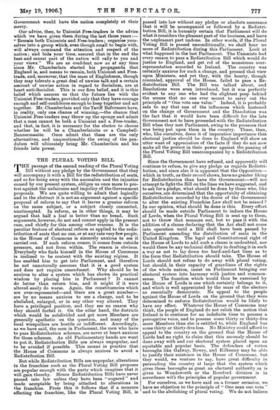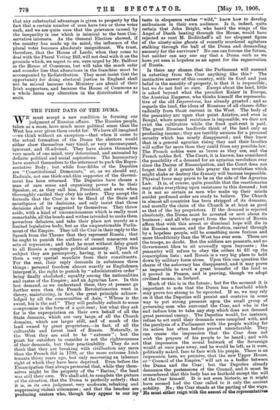THE PLURAL VOTING BILL.
T"passage of the second reading of the Plural Voting Bill without any pledge by the Government that they will accompany it with a Bill for the redistribution of seats, and so for doing away with the anomalies and the injustice caused by our present system, obliges us once more to pro- test against the unfairness and impolicy of the Government proposals. We are quite willing to admit that logically and in the abstract it is not an argument against a specific proposal of reform to say that it leaves a greater reform on the same subject, or a subject closely connected, unattempted. In reform, as in other things, it may be argued that half a loaf is better than no bread. Such arguments, however, do not and cannot apply in the present case, and chiefly for this among other reasons. It is the peculiar feature of electoral reform as applied to the redis- tribution of seats that no one, or at any rate very few people, in the House of Commons is sincerely anxious to see it carried out. If such reform comes, it comes from outside pressure, and not from within. The reason is obvious. Everybody who finds himself in the House of Commons is inclined to be content with the existing regime. It has enabled him to get into Parliament, and therefore he not unnaturally assumes that it is a good system and does not require amendment. Why should he be anxious to alter a, system which has shown its practical wisdom by placing him in Parliament ? It cannot do better than return him, and it might if it were altered easily do worse. Again, the constituencies which are over-represented—and there are a great number— are by no means anxious to see a change, and to be abolished, enlarged, or in any other way altered. They have a privileged position, and they see no reason why they should forfeit it. On the other hand, the districts which would be subdivided and get more Members are generally apathetic on the question, and many of the local wirepullers are hostile or indifferent. Accordingly, as we have said, the men in Parliament, the men who have to pass Redistribution schemes, are never at heart anxious for those schemes. As old Parliamentary hands are wont to put it, Redistribution Bills are always unpopular, and to be avoided if possible. This means in practice that the House of Commons is always anxious to avoid a Redistribution Bill.
But while Redistribution Bills are unpopular, alterations in the franchise such as the Plural Voting Bill proposes are popular enough with the party which imagines that it will gain• thereby. Hence Redistribution Bills have never passed into law unless they have been " sugared " and made acceptable by being attached to alterations in the franchise. From this it follows that if a measure affecting the franchise, like the Plural Voting Bill, is passed into law without any pledge or absolute assurance that it will be accompanied or followed by a Redistri- bution Bill, it is humanly certain that Parliament will do what it considers the pleasant part of the business, and leave the unpleasant part undone. In other words, if the Plural Voting Bill is passed unconditionally, we shall hear no more of Redistribution during this Parliament. Look at what happened in the last Parliament. The Unionists had every reason to pass a Redistribution Bill which would do justice to England, and get rid of the monstrous over- representation accorded to Ireland. The country was certainly anxious for such a change, and pressed that view upon Ministers, and yet they, with the hearty, though concealed, approval of the House, failed to pass a Re- distribution Bill. The Bill was talked about, and Resolutions were even introduced, but it was perfectly evident to any one who had the slightest peep behind the scenes that no one ever meant to carry out the principle of " One vote one value." Indeed, it is probably safe to say that one of the influences which hastened on the change of Government and the Dissolution was the fact that it would have been difficult for the late Government not to have proceeded with the Redistribution Bill when they met Parliament, owing to the pressure that was being put upon them in the country. Those, then, who, like ourselves, deem it of imperative importance that electoral justice should be done to England will show an utter want of appreciation of the facts if they do not now make all the protest in their power against the passing of the Plural Voting Bill unaccompanied by a Redistribution Bill.
Since the Government have refused, and apparently will continue to refuse, to give any pledge as regards Redistri- bution, and since also it is apparent that the Opposition— which in truth, as their record shows, have no greater liking for Redistribution than have the Government—will not attempt te fight the Bill on the lines we have suggested, and to ask for a pledge, what should be done by those who, like ourselves, are determined that the opportunity of obtaining Redistribution accorded by the desire of the Government to alter the existing Franchise Law shall not be missed ? In our opinion, what should be done is this. Every effort should be made outside Parliament to induce the House of Lords, when the Plural Voting Bill is sent up to them, not to throw that measure out, but to pass it with the addition of a clause declaring that the Act shall not come into operation until a Bill shall have been passed by Parliament amending the distribution of seats in the United Kingdom. The legal and Constitutional right of the House of Lords to add such a clause is undoubted, nor would there be any technical difficulty in drafting it in such a way as not to lay down too hard-and-fast lines as to the form that Redistribution should take. The House of Lords should not refuse to do away with plural voting, but should, in their capacity of guardians of the rights of the whole nation, insist on Parliament bringing our electoral system into harmony with justice and common- sense. The function which would thus be exercised by the House of Lords is one which certainly belongs to it, and which is well appreciated by the mass of the electors as essentially democratic. No appeal to the people against the House of Lords on the ground that they were determined to enforce Redistribution would be likely to have any effect. Whatever the House of Commons may think, the people of England do not relish the notion that Ireland is to continue for an indefinite time to possess a prerogative voice, and to possess some thirty or thirty-five more Members than she is entitled to, while England has some thirty or thirty-five less. No Ministry could afford to appeal to the country on the ground that the House of Lords had no right to claim that this anomaly should be done away with and cur electoral system placed upon an equitable and popular basis. The defenders of rotten boroughs like Galway, Newry, and Kilkenny may be able to justify their existence in the House of Commons, but they would, we venture to say, have great difficulty in persuading the country at large that the system which gives these boroughs as great an electoral authority as is given to Wandsworth or the Romford division is in accordance with the principles of popular government.
For ourselves, as we have said on a former occasion, we have no objection to the principle of " One man one vote " and to the abolishing of plural voting. We do not believe that any substantial advantage is given to property by the fact that a certain number of men have two or three votes each, and we are quite sure that the grievance caused by the inequality is one which is inimical to the best Con- servative interests. As the General Election showed, if the country has made up its mind, the influence of the plural voter becomes absolutely insignificant. We trust, therefore, that the House of Lords, when they come to deal with the Plural Voting Bill, will not deal with it on the grounds which, we regret to see, were urged by Mr. Balfour in the House of Commons, but will take the much safer and sounder line that alterations in the franchise must be accompanied by Redistribution. They must insist that the opportunity for doing electoral justice to England shall not be missed because the Ministry are afraid of their Irish supporters, and because the House of Commons as a whole hates any alteration in the distribution of its seats.











































 Previous page
Previous page